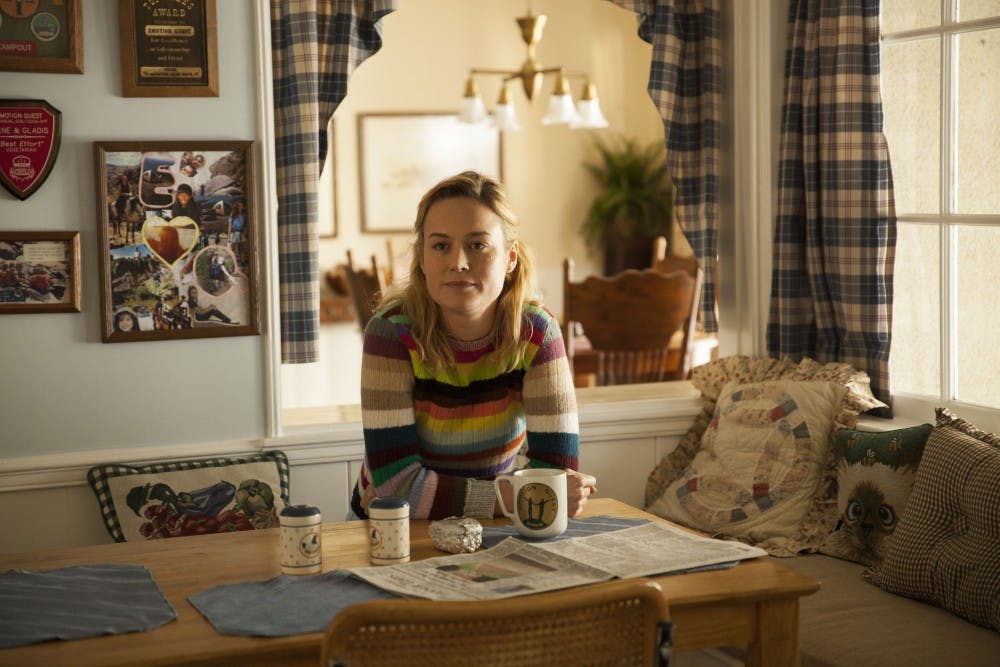In the opening scene of Unicorn Store, twenty–something art student Kit (Brie Larson) is seen bug–eyed, inspired, and furiously working on an art piece about her favorite thing in the world, unicorns. As she covers her blank canvas with glitter and strokes of pink, purple, and blue, she can't help but smear some of the material onto her face (an image that reoccurs quite often throughout the film.) When she's finished, Kit turns and proudly presents the sparkly masterpiece to her three monochromatic and stiff–collared professors, who immediately flunk her, and effectively crush her dreams. This first scene is a good representation of what watching The Unicorn Store is like. It's visuals are stunning and wondrous, and it's filled to the brim with whimsy and quirk, but at the end of the day it's not up to par, and a bit disappointing.
In Larson's directorial debut, we follow Kit as her dreams of becoming a renowned artist are unrealized, largely due to her child–like artistic expression, personality, and outlook on life. She's living in her parents', Gladys (Joan Cusack) and Gene (Bradley Whitiford), house where she begrudgingly adopts an adult lifestyle consisting of coffee, suits, and a new temp job. Mysterious letters lead her to The Store and the eclectic Salesman (Samuel L. Jackson), who dons bright–colored suits and tinsel in his hair. The Salesman offers Kit the chance to earn the one thing she's wanted since she was a little girl—a unicorn. All she must do is build a suitable stable for the unicorn to live in, prove financial security, and create a loving and peaceful environment for the magical animal, as they subsist on love, (naturally). Along the way she deals with her off–putting boss, Gary (Hamish Linklater), as he inappropriately makes passes at her—and starts to spend much of her time with Virgil, (Mamoudou Athie), a sensible hardware shop employee who helps with the construction of the unicorn's stable. Kit becomes disillusioned with the idea of owning her own unicorn as her relationships with her parents, Virgil, and The Salesman enter rocky terrain. But by the end of the film, Kit makes a very adult decision to give her unicorn away, and decides to embark into adulthood—on her own terms.

This film definitely plays to some effective elements of magical realism, but that magic is somewhat lost in Larson's inability to believably portray a wondrous, child–like outsider. The first part of the film focuses heavily on Kit's transition into the adult world. She gets an office job, wears suits, and eats kale at the request of her parents, proclaiming, "Old Kit didn't try hard enough to like things that are disgusting." It's lines like these that cement Kit as the bratty, tantrum–prone adolescent, but it's just so obvious that this isn't Larson. No matter how much she raises her voice, lathers herself in glitter, or widens her eyes—it is painfully clear through the film that Larson is a confident, professional, grown woman playing the colorful, misunderstood weirdo.

The film is cute, but definitely very surface–level, as it hardly reveals any solid internal logic behind The Store or The Salesman. That's fine, and very characteristic of magical realistic movies. We don't necessarily have to know the ins and outs of the magical world—a general gist works fine. But the problem comes when we're not sure what direction the film is trying to lead us towards. We know that Kit is struggling with the outside world urging her to grow up while she wishes to remain in a kid's fantasy world. We know that by the end of the film, Kit decides to reject the unicorn she's dreamed about for decades. But there is no real answer as to why. Are we supposed to believe that Kit's child–like state is one to be preserved and cherished, even when the world tells her otherwise? Are we to feel that Kit's obsession with unicorns and childish outlook on life are unrealistic and unattainable? Unicorn Store spends the entire movie dancing around these questions, leading audiences both ways at times. But the dance quickly becomes dizzying and you're left wanting to take a seat instead.

The strongest parts of Unicorn Store are Kit's relationships, specifically with The Salesman and Virgil. Larson and Jackson are a dynamic duo, as seen in Captain Marvel. Their onscreen dynamic—that of hesitant acquaintances turned best friends—is charming and heartwarming. Jackson, as The Salesman, makes do with the small part he has by contrasting his cutesy outward appearance with occasional profanity and a snappy attitude, which makes for a pretty perfect mystical shopkeeper. Virgil, on the other hand, works at a hardware store—he's as practical and monotone as it gets. But it's a refreshing palate cleanser from Kit's babyish and naive antics. Their budding relationship is quite enjoyable, and their scenes together show lots of emotional vulnerability and depth in Kit that is missing elsewhere.
Overall, Brie Larson's first directorial venture isn't a failure. Every shot in the film is vibrant and beautiful. I haven't enjoyed a coming–of–age romance as much as I enjoyed Kit and Virgil's in a long while. And the idea of purchasing a unicorn from a tinsel–covered Samuel L. Jackson is enchanting. But much like Kit, Larson definitely has some growing up to do.







